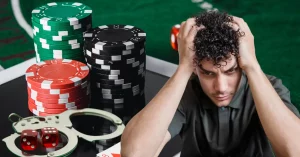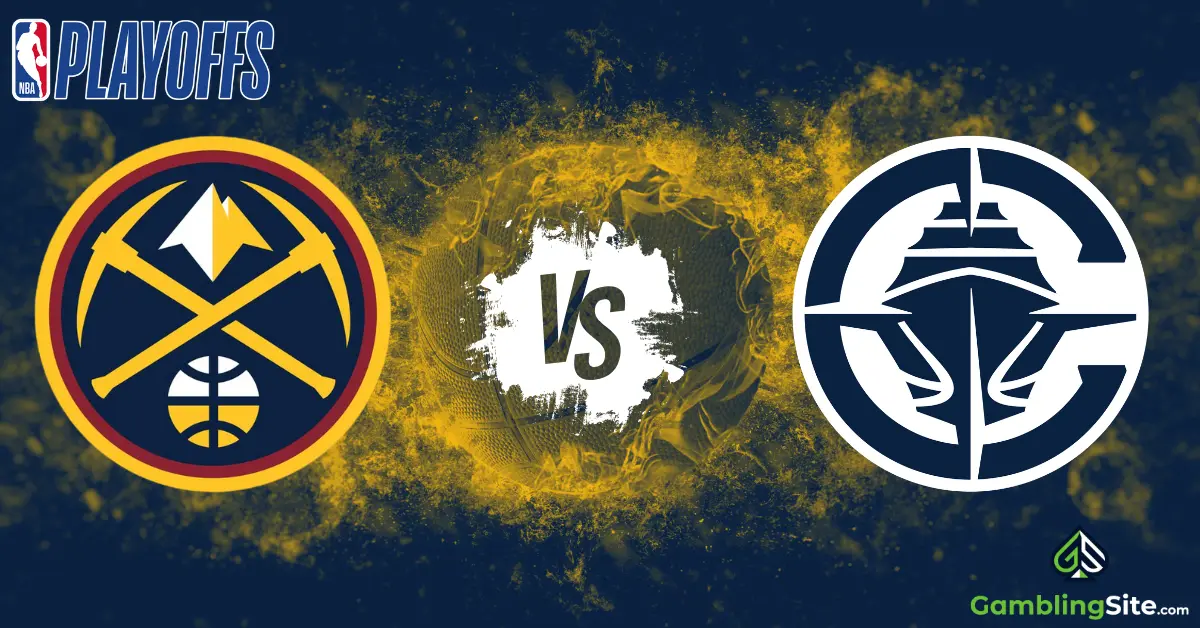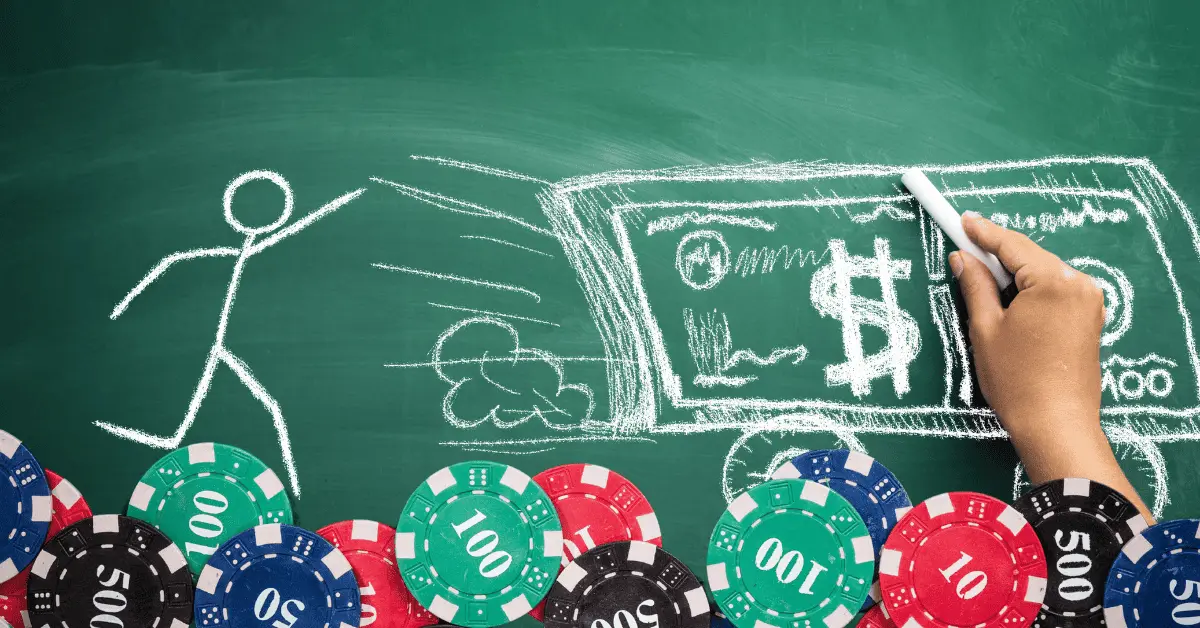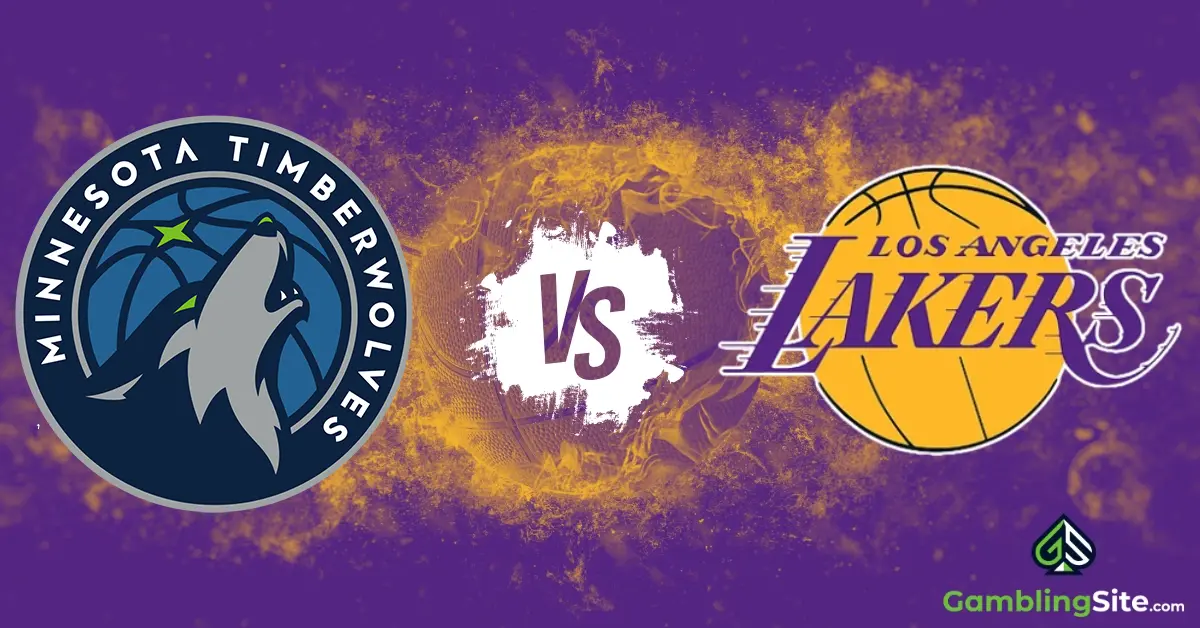The Connection Between Gambling and Mental Health: What You Need to Know
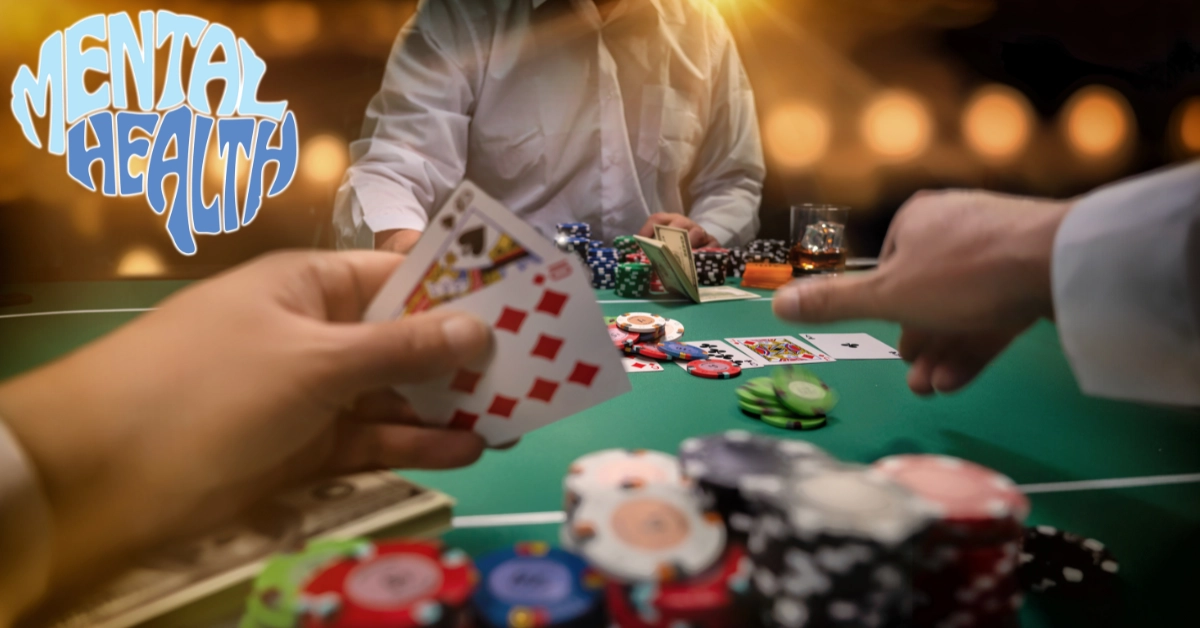
Gambling and mental health are way more intertwined than a lot of people even realize. Why? Because the sometimes extreme emotional highs and lows of gambling will take a toll, and it will affect everything from a person’s mood to their personal relationships. And now that mental health is being talked about more openly as opposed to a decade ago, a lot of people feel comfortable talking about the challenges they face, and the conversation happening around the connection is a very worthy topic.
Understanding how gambling can impact a person’s mental well-being isn’t only to raise awareness about the issue—it’s also a way to help players recognize the risks, spot the warning signs, and know where to get help if they need it. If you’re a gambler or someone who cares about one, our guide is going to cover everything about the link between gambling and mental health and give you the best resources to navigate it if it happens to you or someone you love!
Understanding the Psychological Impact of Gambling
Let’s talk about dopamine! You know, that “feel good” chemical that lights up when you are doing something fun and exciting. Welp, gambling directly interacts with the brain’s pleasure and reward centers. Every single bet that you make triggers a release of dopamine. Interestingly enough, it’s not just the wins that produce dopamine—even the thought of a possible reward activates the chemical response, which means that people will still engage even when they lose.
What makes gambling super tricky is its intermittent reward system. There aren’t any consistent rewards, as gambling outcomes are always unpredictable, and the uncertainty, believe it or not, makes it even more attractive. The brain gets wired to chase the “next win,” and then causes some people to gamble way longer than they should or take much bigger risks—all to repeat that initial rush.
The brain will rewire and develop a tolerance to the dopamine surges, and what began as occasional gambling for fun could take way higher stakes or habitual betting to get the same feelings of excitement or escape. The progression mimics patterns that are seen in other kinds of addictions, and this demonstrates the very fine line between entertainment and compulsive behavior.
Further compounding the issue, gambling can turn into a coping mechanism for an underlying emotional challenge. Stress, anxiety, loneliness, or trauma can all push people to gamble as a way to temporarily escape or numb any uncomfortable feelings they don’t want to sit with. And sure, it might give them short-term relief, but the aftermath—financial loss, relationship issues, or declining emotional health—creates a vicious cycle that’s really hard to break without professional intervention.
Statistics
The overlap between gambling and mental health struggles is pretty significant, and the data underlines the need for both awareness and action. The following are some pretty scary statistics:
- Prevalence of Mental Health Conditions: Studies consistently show that those who have issues with gambling are far more likely to experience anxiety, depression, and other emotional difficulties compared to those without gambling problems. Research from the National Council on Problem Gambling states that about 50% of people with a gambling addiction also suffer from a mental health condition.
- Anxiety Disorders: Gambling usually ramps up the feelings of worry and fear, especially when money is on the line. It’s estimated that generalized anxiety disorder is nearly twice as common among people who have a gambling addiction.

- Depression: Feelings of guilt, shame, or hopelessness can come after big losses or strained relationships. Studies indicate that people who gamble excessively are much more likely to experience severe depression compared to the general population.
- Substance Use Disorders: The connection between gambling and substance abuse is well-documented. A lot of people with gambling problems turn to drugs or alcohol as a way to cope, and vice versa. A 2023 study found that nearly 20% of those with gambling addiction also meet the criteria for a substance use disorder.
- Suicide Risk: Among all behavioral addictions, gambling carries one of the highest suicide risks. A study published in the “Journal of Gambling Studies” reported that up to 17% of people with severe gambling issues have attempted suicide at least once.
Common Mental Health Challenges Associated with Gambling
Most of the time, gambling is shown as an exciting and entertaining pastime, but what the marketing and ad campaigns don’t show is that it can cause severe emotional and psychological burdens. The ripple effects of gambling can and do affect mental health in ways that are hard to spot—at first—but they gradually compound if a person doesn’t know when to or can’t stop. Next up, we look at the challenges that usually come with people who struggle with gambling.
The weight of gambling-related losses doesn’t just hit people’s wallets and bank accounts—it can take a harsh toll on emotional well-being. For many, financial hardships that are caused by gambling create a persistent sense of failure or hopelessness. These are feelings that are usually magnified when gambling results in strained relationships or job instability.
What makes gambling particularly tied to depression is the cycle of emotions: the initial high of a win contrasts sharply with the despair of losses. It’s an emotional seesaw that makes people feel like they are trapped in their circumstances and they don’t know how to climb out. The sense of entrapment can turn into clinical depression, and that will make it even harder to break free from gambling habits.
Gambling is a constant push and pull between risk and reward, but for those who are facing increasingly high debts or repeated losses, this tension can result in severe anxiety. The fear of being found out, the pressure to cover up any financial troubles, or the shame of asking for help can cause gamblers to be in a chronic state of worry.
The physical symptoms of anxiety—like restlessness, difficulty sleeping, or panic attacks—usually amplify the emotional toll. Gamblers might feel they’re walking a tightrope, juggling financial obligations while trying to maintain a façade of normalcy. In a lot of cases, this kind of enormous stress will push people to gamble more as a way to escape these worries temporarily, and that makes it a self-perpetuating cycle.
When gambling feels like it’s spiraling out of control, some people will turn to alcohol or drugs to cope. Gambling and substance abuse routinely co-occur because both are a temporary reprieve from stress, guilt, or shame. Unfortunately, this pairing only worsens the challenges gamblers have, as it adds new health, financial, and relational struggles.
Substance use will feel to some merely like a way to “take the edge off” the stress that’s caused by gambling, but in time, it can cause dependence. This is a dangerous combination that makes recovery way more complicated, as now there are multiple forms of addiction simultaneously to overcome. The presence of substance abuse can also delay getting help, as the shame and stigma that is attached might stop people from getting support.
The connection between gambling and suicidal ideation is really alarming, but it tends to be glossed over in public conversations. For those who are facing severe financial losses, broken relationships, and a sense of hopelessness, the idea of escape can be seen as their only way out.
Studies have shown that gamblers are at a higher risk for suicide compared to the general population. One reason for the elevated risk is the feeling of “no way out” when debts become insurmountable or when relationships fall apart. Gamblers struggle with this burden all alone, as they feel like they can’t voice their struggles due to guilt or a fear of being judged.
The stigma surrounding gambling addiction only intensifies these feelings of isolation, making it even harder to get help. This is why creating open, judgment-free spaces for discussion and intervention is critical. Suicide prevention resources, crisis hotlines, and access to mental health support can save a life for someone who is in this situation.
Warning Signs of Gambling-Related Mental Health Issues
The signs of gambling-related struggles aren’t always obvious—they can be super subtle, and they can creep into everyday life before they do become obvious. If you’re able to recognize the early behavioral, emotional, and physical signs, it will be easier to take action before it becomes worse.
Behavioral Signs
When gambling begins to take over a person’s actions and priorities, their behavior will probably start to change in the following ways:
- Constant Preoccupation: When someone is always thinking about gambling—planning when they can play again, reliving their past wins, or obsessing over strategies—it’s usually a good sign of growing dependency. The fixation can crowd out other priorities like work or family time, and a person’s focus can shift entirely toward gambling.
- Neglecting Responsibilities: Skipping important obligations, avoiding bills, or missing work to gamble is a huge red flag, and this neglect can create ripple effects, which can manifest as strained relationships, job instability, or financial turmoil.
- Secrecy and Concealment: A lot of people try to hide their gambling habits by being evasive about the time they spend doing it or how much money they lose. They will usually downplay their gambling when asked or straight-up lie about where they’ve been or how they’ve been spending money.
- Chasing Losses: A hallmark of problematic gambling, this behavior involves betting more in an attempt to recover any previous losses. It’s a cycle that results in even worse financial damage, and that puts the gambler in a precarious situation.
Emotional Signs
The emotional effects of gambling can rear their heads and manifest as unpredictable mood shifts or strained relationships. Here’s what to watch for:
- Mood Swings: Gambling’s highs and lows don’t just hit their bank account—they can cause noticeable emotional shifts. A big win might cause euphoria, but a series of losses can mean frustration, sadness, or anger.
- Irritability and Restlessness: When gambling starts to feel like the only relief from stress, those in its grip can become short-tempered or uneasy during downtime. This kind of constant agitation can make everyday interactions really hard.
- Withdrawal from Loved Ones: People who are grappling with gambling issues often isolate themselves, and this stems from guilt or a desire to avoid judgment, but it means that the support they may desperately need is absent.
- Guilt and Regret: Emotional exhaustion usually comes after a gambling binge, especially when big losses or broken promises enter the picture. While regret can and does motivate change, in many cases, it only keeps people stuck in a cycle of shame.
Physical Signs
While we are concentrating on the emotional side of things, there is also a physical toll that gambling can take—it’s linked to the stress and starts to manifest in the body.
- Sleep Problems: Restless nights, insomnia, or disrupted sleep schedules are super common when someone is consumed by gambling-related stress. Worrying over losses or replaying outcomes in their head can keep them awake for hours on end.
- Appetite Changes: Stress from gambling can cause erratic eating habits—either skipping meals altogether or overeating as a way to cope with anxiety or sadness, and this impacts a person’s physical health.
- Stress-Related Health Issues: Gambling stress doesn’t just stay in the mind—it manifests physically. Tension headaches, high blood pressure, and digestive issues are really common in people who are dealing with gambling problems.
How Gambling Affects Relationships and Social Well-being
For the majority of players, gambling usually starts out as a fun and harmless pastime! But when it stops being fun and veers into excessive territory, it can harm relationships and social connections in really profound ways. And the effects usually extend past financial issues—it’ll creep into every corner of a person’s well-being and their interactions with other people in their lives.
Impact on Relationships
Problematic gambling behaviors can also have a devastating effect on relationships with family, friends, and romantic partners. Trust can deteriorate when gambling results in secretive behavior or dishonesty. Finding out about hidden debts, unexplained absences, or misleading info about finances most often causes feelings of betrayal and resentment between partners.
Parents who gamble excessively might neglect family responsibilities, miss important moments, or fail to meet financial obligations. Children in these households might feel like they are emotionally neglected or be confused by the tense environment. Similarly, friendships can become strained, especially when borrowing money or broken promises are involved.
The emotional fatigue caused by these dynamics can cause relationships to become fractured. In some cases, unresolved issues result in separations, estrangement, or long-term conflicts within families and social circles.
Financial Stress

The financial toll of gambling is one of the most visible consequences and a significant source of strain in relationships. Growing debts, depleted savings, and the need to borrow money can destabilize households, cause arguments over finances, and damage—sometimes forever—trust.
In the most severe cases, people will sell their personal belongings or turn to illegal activities to fund their gambling habits. The resulting financial instability can mean evictions, bankruptcies, or foreclosures, and that puts immense pressure on families and partnerships.
The financial challenges have a cascading effect, as they only increase stress and tension within relationships. For some, the added pressure may cause irreparable damage, which further isolates the person and causes a cycle of harm that extends into multiple areas of their life.
Social Isolation
The secrecy and shame that surround gambling addiction tend to make those suffering from it withdraw from social interactions. People experiencing gambling-related struggles might decline social invitations, avoid the things they once enjoyed, or minimize their time with friends in favor of gambling.
This withdrawal is commonly driven by feelings of guilt or fear of judgment, again because the stigma that is attached to gambling addiction discourages people from being open about their struggles, and that causes feelings of isolation. As a result, the loneliness created by these behaviors can push them even further into gambling as a way to cope, and that is a cycle that is harder to break.
An absence of meaningful social connections deprives people of needed emotional support, and that makes it even harder to ask for help or change their behaviors.
The Positive Side: Responsible Gambling Practices
Gambling is inherently a fun form of entertainment when it is done in a responsible way! How can you gamble responsibly? By establishing boundaries, being informed, and learning from those who have had similar challenges. The practices don’t just stop gambling from becoming harmful—they also encourage a balanced and mindful approach.
Promoting Healthy Habits
Building responsible gambling habits all starts with taking control of time, money, and overall behavior. The following strategies can help make sure that gambling stays what it is meant to be—a recreational activity, not a source of harm:
- Setting Time Limits: Scheduling specific periods for gambling will keep it from encroaching on responsibilities and relationships. For example, you should designate one afternoon or evening for betting or online play—it prevents any excessive engagement.
- Establishing Financial Boundaries: Creating a strict gambling budget guarantees that no more than a predetermined amount of disposable income is spent. Using cash instead of credit cards or apps tied to bank accounts makes it much easier to stick to these boundaries.
- Taking Breaks: Pausing during a session gives you the time to think and assess your decisions. Gamblers who take a break every 30 minutes or after a set number of bets all find it easier to be mindful of their actions.
- Avoiding Emotional Decisions: Gambling during any time of stress, anger, or sadness has been shown to escalate impulsive behavior. Most responsible gamblers learn to pause and evaluate their emotional state before they play.
The Role of Education
Education plays a super important part in promoting responsible gambling! If you don’t know what the risks are, how can you make the best decisions? That’s why you should be schooled on the following:
- Learning the Odds: Understanding how games operate helps gamblers make the most informed choices. If you know that slot machines have low payout probabilities or that poker takes both skill and luck, you’ll have a realistic view of winning and losing.
- Recognizing Misconceptions: A good portion of gamblers believe in myths like “hot streaks” or the idea that past losses will increase the likelihood of future wins. These are myths, and debunking them means that you have the healthiest expectations about gambling.
- Identifying Red Flags: Education on warning signs—like using money that is meant for necessities, borrowing to gamble, or hiding your gambling—empowers people and their loved ones to intervene early on if problems do arise.
- Accessing Support Tools: Online tools, like budget trackers or self-assessment quizzes, all help gamblers monitor their habits. These are great resources that create awareness of spending patterns and allow for course corrections if and when it’s needed.
Case Studies
Hearing it right from the horse’s mouth—the people who have successfully beat the odds and overcome gambling addiction or have a solid balance when it comes to their gambling habits is the best way to understand and learn. The following is just a sampling of these players:
Rob Minnick’s Journey
Rob Minnick, a gambling addict turned blogger and social media influencer, described a six-year period from 2017 to 2023 as “hellish.” What started out as misconceptions about making quick money from gambling, fueled by initial wins on basketball bets, quickly escalated to spending 6-8 hours daily on various sports betting apps and table games. Eventually, Minnick experienced devastating financial losses and personal turmoil, strained relationships, and rapidly declining mental health. When he recognized that he had a gambling problem, he got help and is in recovery.
Adam’s Story
Adam, a 34-year-old father, talked about how he lost most of his savings to gambling. He got help from a local support group, which taught him how to budget and recognize his emotional triggers. With therapy and group sessions, Adam learned to manage his gambling as a casual activity and is focusing on rebuilding trust with his family.
Maria’s Road to Recovery
Maria, a former compulsive gambler, described how her addiction affected her relationships and career. After seeking professional counseling, she adopted strategies like setting a monthly gambling budget and limiting her time at casinos. She now volunteers with a responsible gambling organization, and she is helping others get control of their habits.
Chen’s Experience
Chen, an entrepreneur, fell into gambling as a way to cope with business stress. As his losses grew, he recognized the need to address his behavior. Chen credits therapy and mindfulness practices for helping him find a balance, and he now advocates for others to treat gambling as a mindful activity—not as a source of relief.
Paul’s Turnaround
Paul, a recovering gambler, found success via a combination of therapy and self-imposed rules. He started tracking his spending daily and set non-negotiable limits for time and money, and his ability to play responsibly has allowed him to restore his personal and professional life.
Resources for Help and Support
Acknowledging the need for help with gambling-related challenges is the first and most important move to reclaim balance and well-being. There are professional services, group support, and self-help tools—all are ways to get the support you need!
Professional Support
Getting guidance from trained professionals will give you personalized tools so that you can manage your gambling behaviors and address any underlying causes:
- Therapists and Psychologists: Mental health experts are equipped to help individuals uncover triggers and develop strategies for lasting change. Cognitive Behavioral Therapy (CBT) has been shown to be particularly effective in managing gambling behaviors. The National Council on Problem Gambling provides a directory of certified counselors specializing in gambling addiction.
- Specialized Gambling Counselors: These are professionals who focus exclusively on gambling-related issues, and they give targeted guidance to people and families. State-level organizations, like the Council on Compulsive Gambling of New Jersey, offer tailored support services.
Support Groups
Joining a community of people who are all struggling with similar challenges is a super helpful way to get encouragement, accountability, and practical insights:
- Gamblers Anonymous (GA): A 12-step program that brings individuals together to share experiences and support recovery. Meetings are available in person and online to accommodate different needs.
- SMART Recovery: An evidence-based program that has tools for self-management and overcoming addictive behaviors. It has meetings that are focused on building resilience and managing urges.
- Gam-Anon: Created for loved ones of those affected by gambling, Gam-Anon has a really supportive environment where people can share their experiences and learn the most effective ways to cope.
Hotlines and Websites
Accessible and confidential support is only a call or click away:
- National Problem Gambling Helpline: Available 24/7 by calling 1-800-GAMBLER (1-800-426-2537), this helpline connects people to local resources and support services.
- GamCare: A UK-based organization that has a free live chat, telephone support, and online tools for managing gambling behaviors.
- Gambling Therapy: An international online platform providing live support, resources, and forums for those who are struggling with gambling issues.
- State-Specific Helplines: Most states with legalized gambling have dedicated hotlines and websites that are tailored to regional resources and services.
Self-Help Strategies
For those who want to try out an independent approach, there are some really effective techniques to build healthier habits and take back control, like the following:
- Journaling: Writing about triggers, emotions, and patterns can help people get valuable insight into their behavior, and then they can make intentional changes.
- Mindfulness and Relaxation Techniques: Practices like meditation, deep breathing, or yoga can decrease stress and improve focus, which makes it easier to resist impulsive decisions.
- Financial Planning: Creating a strict budget and tracking expenses can help people take control of their finances. Tools like apps or spreadsheets are there to make this process more manageable.
All of the above resources will give any struggling a strong foundation so that they can address problem gambling and get back to stability.
Conclusion: Betting on a Better Future
Gambling can touch so many areas of life—your emotions, relationships, and overall well-being—not just your finances, which is why it’s so important to know how it is all connected. Catching the early warning signs of a problem will make it easier to be proactive and find the right kind of support.
Keep scrolling for a quick summary of why it’s so important to understand the impact gambling can have on a person’s mental health:
- Gambling impacts more than just finances—it influences emotional health, relationships, and a person’s overall well-being.
- Recognizing the connection between gambling and mental health helps identify early signs of possible issues.
- Awareness means proactive intervention and access to effective support and recovery tools.
- Resources like therapy, support groups, and self-help strategies can steer people toward healthier habits.
- Encouraging responsible gambling practices helps people maintain a balance and can prevent negative outcomes.
There’s no shortage of help out there—you can talk to a professional counselor, join a support group, or learn more about responsible gambling; there are so many tools and resources that are available to help you or someone you care about find their balance again.
If gambling does feel like it’s getting the best of you, making even small changes can make a big difference. It doesn’t have to control your life! If you set boundaries and are aware of the danger zones, it can stay what it is meant to be—fun—without any of the dangerous downsides.
FAQs
Gambling has both highs and lows, and the lows can start to wreak havoc on your mental and financial health and your everyday life. Below are answers to some of the most frequently asked questions our readers have sent us about gambling, the mental health risks, and how to get help if you need it!
What Are the Mental Health Risks of Gambling?
Gambling can lead to lots of mental health risk, and they include the following:
– Anxiety and stress that’s caused by financial losses or mounting debts.
– Depression is usually linked to feelings of guilt, hopelessness, or strained relationships.
– Addiction, which fuels compulsive behaviors and increases emotional distress.
– Increased suicide risk for people who feel overwhelmed by the financial and emotional strain.
How Can I Recognize if Gambling Is Affecting My Mental Health?
Signs that gambling may be negatively impacting your mental health include the ones below:
– Feeling anxious, irritable, or restless when you aren’t gambling.
– Neglecting work, family, or social commitments in favor of gambling.
– Experiencing guilt or regret after your gambling sessions.
– Borrowing money or selling items to fund your gambling.
– Hiding your gambling activities or lying about the amount of time or money you have spent.
If any of these patterns sound a little too familiar, it might be time to think about your gambling habits and reach out for help and support.
What Are the Steps to Stop Gambling Addiction?
Breaking free from gambling addiction isn’t easy, and it takes a lot of commitment and support. If you think you need to, you should follow the guidelines below:
– Acknowledge the problem: Recognizing that gambling has become an issue is the first and most important move.
– Get professional help: Therapists and counselors can help address any underlying causes and help you build healthier coping mechanisms.
– Set boundaries: Limit access to gambling through self-exclusion programs or software that blocks gambling sites and apps.
– Build a support network: Lean on your friends, family, or support groups like Gamblers Anonymous so that you will stay accountable.
– Find alternative activities: Replace gambling with hobbies, exercise, or any other activities that you like doing to decrease stress.
Are There Resources Specifically for Online Gamblers?
Yes! There are so many valuable resources that cater specifically to people who gamble online! Here are the best ones to look into:
– Blocking Software: Tools like Gamban and BetBlocker prevent access to gambling websites and apps.
– Online Support Groups: Communities like SMART Recovery and Gambling Therapy offer virtual meetings and forums for support.
– Helplines and Chat Services: Services like the National Gambling Helpline provide 24/7 assistance that is tailored to online gamblers.
– Self-Assessment Tools: Websites like GamCare have quizzes and trackers so that people can monitor their gambling habits.
If gambling online (or in person) feels unmanageable or like it’s taking over your life, the tools above have helped millions of people regain control of their gambling!

Alyssa contributes sportsbook/online casino reviews, but she also stays on top of any industry news, precisely that of the sports betting market. She’s been an avid sports bettor for many years and has experienced success in growing her bankroll by striking when the iron was hot. In particular, she loves betting on football and basketball at the professional and college levels.


